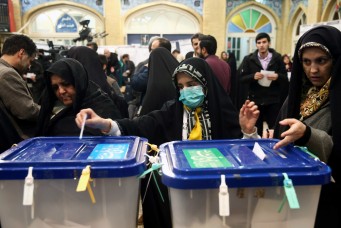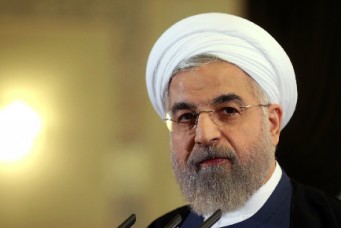Nostalgia and Naivete—Watching Argo as an Iranian American
My reaction to last year’s blockbuster hit, and now multiple Oscar-winner, Argo was probably different than most people. Watching those Americans trapped in Tehran, bizarrely enough, evoked memories of my adolescence.
My reaction to last year’s blockbuster hit, and now multiple Oscar-winner, Argo was probably different than most people. Among many things, it made me nostalgic. Watching those Americans trapped in Tehran, bizarrely enough, evoked memories of my adolescence. While the film did not portray the Iran I knew, it reminded me of the overwhelming, irrational, and hypersensitive feelings I had while living in the country as a teenager.
In 1999, at the tender age of thirteen, I moved to Iran from my home in southern California, after my Iranian mother’s remarriage to a fellow Iranian. I had the choice to stay behind with my American father, but decided instead to embark on a journey to the far side of the globe, not knowing the potential ramifications – positive and negative – of the decision I was making.
Until the move, my view of Iran had been formed by distant memories of visiting my maternal homeland when I was five-years-old and watching the fiercely anti-Iran film, Not Without My Daughter.
When I first arrived in Iran, I hated it and could not understand why things were the way they were there. I had no knowledge of Prime Minister Mohammad Mossadegh or the coup in 1953, which was primarily organized by the CIA and a driving force behind the 1979 Iranian Hostage Crisis. Back then, the sheer terror the Americans would reinstall the Shah of Iran, which drove the hostage takers’ actions, was unfathomable to me.
My ignorance gave me no foundation by which to understand my surroundings. This circumstance caused me endless confusion, like the time when I was asked to read aloud from a textbook about the Iranian Revolution during my world history class. The book stated that the leader of the revolution, Ayatollah Ruhollah Khomeini, died in 1989. Thinking I had found an error in the text, I pointed it out to my teacher, and was met with hysterical laughter from my entire 7th grade class. How could I have known a man whose ubiquitous visage decorated everything from billboards to office walls to shop windows was no longer alive?
Politically, I was innocently naïve, to say the least.
Then there were the occasional televised chants of “Marg bar Amrika” set against burning American flags. This was the utmost insult to me as an American.
“How could they say and do such things?,” I would ask myself.
My naïveté compounded feelings of melancholy during the first year or so that I was in Iran. The culture shock was overwhelming, especially when it came to wearing the headscarf in public and keeping a look out for the morality police, the Kommiteh. It didn’t help that many Iranians I encountered exaggerated everything out of an overbearing concern for my safety. “They will arrest you because you’re American,” I was often told. I eventually learned this was not the case. In fact, my American citizenship (citizenship is patrilineal in Iran) would actually save me from suffering the consequences of my actions on the streets of Tehran when I got older, more self-assured, and impulsive.
During those early years in Iran, I felt like a hostage, steeled by my own will and determination to stick it out with my mother. The iron bars on the second-story windows of my classroom at Tehran International School reinforced these feelings of being trapped. If I was not sobbing about my ‘situation’ to fellow classmates, I was daydreaming during English Literature class, often fantasizing about American Marines breaking through the iron bars and whisking me away from the jail I knew as the Islamic Republic of Iran.
This was the price I had to pay for my split identity as both an Iranian and an American. As I got older, however, my views on Iran became better informed and more sympathetic. Travelling from the capital Tehran to Esfahan, Hamadan, Rasht, Shiraz and other major cities, I was met with continual kindness and generosity. I learned to love Iran through the minutiae of daily life. I learned about its rich culture and fascinating political history.
I became forever indebted to the people of Iran – the shop keepers, hair stylists, former Shah-era military captains turned-taxi drivers, the youth, members of other religious sects, the well-educated, and political prisoners of both regimes – who openly shared their stories, answered my questions, and adopted me with open arms as one of their own. For me, they were some of the most welcoming people in the world.
As the years went by, I saw the headscarves women wore inch further and further back, revealing more of their highlighted hair with each new spring. As satellite dishes (albeit illegal) became as common as Tehran’s traffic jams, I found Iranians watching American television sitcoms like Friends and sharing opinions about their favorite American films.
The Iran of 1979 is not the Iran of 1999 or 2009, but now – just as during the revolution – it is vibrant and diverse. Iranians are not all or nothing, not just a screaming horde of protesters in bellbottoms and beards, nor a repressed mass of frustrated, secular dissidents in t-shirts and green scarves.
When Argo was released in October 2012, I was both skeptical and eager to see it. For many Iranian-Americans, the film brought back feelings of trauma about the hostility and discrimination they faced in the United States during the hostage crisis. Many spent the early-mid 1980s hiding their “Iranian” heritage or labeling themselves “Persian,” in order to evoke a mysterious, exotic, and less politically-charged identity.
As journalist Omid Habibinia notes, “Argo is a representation of Hollywood’s power to present reality and shows that it’s possible to make a film with an actual event as a pretext for stereotypical storytelling, which audiences are accustomed to and nothing more.” Intentionally or not, Argo reinforces Western stereotypes about Iran at a time when the neocons are continuously pushing for a new war in a never-ending effort to remake the world in their own image.
For those who have watched or intend to watch Argo, please keep an open mind. Argo presents a sensationalized and simplified version of Iran in January 1980. By contrast, last year’s Oscar-winning Iranian film, A Separation, provides a more honest depiction of the Iran I have come to know and love: a real place full of real people, not simply caricatures content to serve as a backdrop or play bit parts in someone else’s story.
Holly Dagres is a reporter-researcher for the




